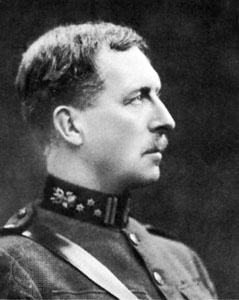Albert I
king of Belgium
born April 8, 1875, Brussels, Belg.
died Feb. 17, 1934, Marche-les-Dames, near Namur
 king of the Belgians (1909–34), who led the Belgian army during World War I and guided his country's postwar recovery.
king of the Belgians (1909–34), who led the Belgian army during World War I and guided his country's postwar recovery.The younger son of Philip, count of Flanders (brother of King Leopold II), Albert succeeded to the throne in 1909—Leopold's son and Albert's father and older brother having died earlier. Before World War I, Albert worked to strengthen the army, gaining passage in 1913 of a military conscription bill. He reaffirmed Belgian neutrality to France and Germany in the summer of 1914 and rejected the German emperor William II's ultimatum of Aug. 2, 1914, demanding free passage of German troops across Belgian territory. A German invasion followed two days later.
Albert assumed leadership of the Belgian army at the outset of the war but was forced to retreat beyond the Yser River after the fall of Antwerp in October 1914. German troops then occupied the entire country except for the southwestern districts of Flanders. During the whole of the war Albert remained with his troops, making continual visits to the front-line trenches from his headquarters at De Panne on the Belgian coast. When the general Allied offensive of September 1918 was undertaken, he commanded the Franco-Belgian northern army group, which captured Ostend and Brugge and forced the passage of the Lys River.
Following the Armistice Albert appealed to the Allies to abolish Belgian neutrality, formalized by European treaties in 1839, and gained passage in Parliament of universal male suffrage. For the next 15 years he guided the nation's rebuilding effort, which included public-works construction and redevelopment of industries destroyed by the German occupation. In 1926 he helped introduce a new monetary system. Albert was killed by a fall while rock-climbing in 1934.
king of Germany and duke of Austria
born c. 1255
died May 1, 1308, Brugg, Switz.
duke of Austria and German king from 1298 to 1308 who repressed private war, befriended the serfs, and protected the persecuted Jews.
The eldest son of King Rudolf I of the House of Habsburg, Albert was invested with the duchies of Austria and Styria in 1282. After Rudolf's death (1291), the electors, determined to prevent the German crown from becoming a hereditary possession of the Habsburgs, checked Albert's aspirations by choosing Adolf of Nassau as German king. Albert, however, drew the electors into an alliance and engineered the deposition (June 23, 1298) of Adolf, who was defeated in battle and slain on July 2, 1298, at Göllheim.
Albert's election, proclaimed at Mainz before the battle, was repeated at Frankfurt on July 27; he was crowned at Aachen on August 24.
Albert formed an alliance in 1299 with Philip IV of France against Pope Boniface VIII, who had refused to recognize him as king. He tried to increase the power of his house by claiming (unsuccessfully) possession of Holland, Zealand, and Frisia as vacant fiefs. His pro-French policy and his effort to control the mouths of the Rhine were opposed by the four Rhenish electors, who tried to depose him. Albert, aided by the cities of the Rhineland, crushed the coalition in a series of campaigns between 1300 and 1302. He obtained confirmation of his election from Pope Boniface VIII on April 30, 1303, swore an oath of obedience to the pope, and promised that none of his sons should be elected German king without papal consent. His attempt to place his son Rudolf on the vacant throne of Bohemia in 1306 was only momentarily successful, and his claim to Thuringia and Meissen, inherited from Adolf of Nassau, was checked by a defeat near Lucka in 1307. Albert was assassinated by his nephew John of Swabia, later called the “Parricide,” from whom the King had unjustly withheld his inheritance.
margrave of Brandenburg
also called Albert the Bear, German Albrecht der Bär
born c. 1100
died Nov. 18, 1170
the first margrave of Brandenburg and founder of the Ascanian Dynasties. He was one of the main leaders of 12th-century German expansion into eastern Europe.
In 1123 Albert inherited Saxon estates between the Harz Mountains and the middle reaches of the Elbe River from his father, Otto the Rich. After his mother's death in 1142, he received the central German possessions of the Billung dynasty, but he was unsuccessful in his attempts to win the Saxon duchy.
His greatest achievement was in the east, where, in return for his services to the Holy Roman emperor Lothar II, in Italy (1132), he received the North Mark, east of the junction of the Elbe and Havel rivers (1134). He spent three years campaigning against the Wends (Wend) and, by an arrangement made with Pribislav, prince of the Havelland, he obtained that district after the prince's death in 1150. Taking the title margrave of Brandenburg, Albert pressed the warfare against the Wends, extended the area of his mark, and increased its population and prosperity by introducing Frisian and Saxon settlers. Albert had the help of the Premonstratensians and Cistercians in forest clearance and drainage of swamps. He coupled colonization with missionary work among the Slavs and revived the bishoprics of Havelberg and Brandenburg.
Lothar's successor, Frederick I Barbarossa, may have made Albert archchamberlain of the empire, an office that later gave the margraves of Brandenburg the rights of an elector.
- Coverdale, Miles
- covered bridge
- coverture
- Covilhã, Pêro da
- coving
- Covington
- cow
- Coward, Sir Noël
- cowbane
- cowbird
- cowboy
- Cowbridge
- Cowdray, Weetman Dickinson Pearson, 1st Viscount
- Cowell, Henry
- Cowell, Simon
- Cowen, Brian
- Cowen, Sir Frederic Hymen
- Cowes
- cowl
- Cowles family
- Cowles, Henry Chandler
- Cowley, Abraham
- Cowley, Malcolm
- Cowl, Jane
- cow parsnip